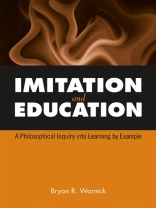Brings together current research in philosophy, cognitive science, and education to uncover and criticize the traditional assumptions of how and why we should learn through imitation.
Imitation and Education provides an in-depth reassessment of learning by example that places imitation in a larger social context. It is the first book to bring together ancient educational thought and startling breakthroughs in the fields of cognitive science, psychology, and philosophy to reconsider how we learn from the lives of others. Bryan R. Warnick addresses how we become exemplars, analyzes how exemplars inspire imitation, and assesses the meaning and value of imitation in education and society, including how teachers can better use examples and what should be done about problems such as the imitation of media violence. Warnick constructs a provocative, cautionary, yet hopeful account of learning by example that acknowledges the power of social contexts in shaping human lives.
Table of Content
Acknowledgments
1. The Problems of Imitation and Human Exemplarity
The Mysteries of Learning by Example: An Outline
2. The Historical Tradition of Human Exemplarity
Imitative Models of Human Exemplarity: The Standard Model
Enlightenment Criticism and Nonimitative Exemplars
The Historical Tradition: An Initial Assessment
3. How Do People Become Examples?
The Nature of Examples
How Does Something Become an Example?
Educational Implications
Conclusion
4. How Do Examples Bring Out Imitation?
The Link between Action and Perception
The Sense of Self and the Imitative Sorting Mechanism
The Narrative-Self Theory of Imitation
The Social Nature of Narrative and Imitation
Educational Implications
Conclusion
5. The Social Meanings of Imitation
The Meanings of Following an Example
Imitation and Community Identity
Imitation, Initiation, and Education
Factors Influencing Imitative Meaning
Imitation and Communities of Learning
Conclusion
6. Imitation, Exemplarity, and Moral Reason
The Practical Objection to Imitating Examples
A Social Response to the Practical Objection
The Theoretical Objection to Imitating Examples
A Social Response to the Theoretical Objection
Conclusion
7. How Can We Evaluate Human Exemplars?
Ancient Skepticism, Exemplarity, and Criticality
The Turn to Practices and Exemplar Rotation
A Critical Education and Exemplarity: A Conclusion
8. A Social Analysis of Exemplarity and Imitation
Notes
References
Index
About the author
Bryan R. Warnick is Assistant Professor of Philosophy of Education at the Ohio State University.












